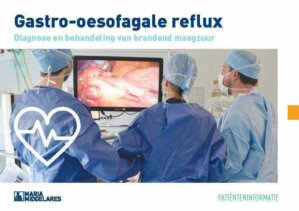Reflux
Symptoms and causes
Symptoms and causesWhat is it?
Gastroesophageal reflux (GOR), also known as heartburn or acid reflux, is the return of stomach contents to the oesophagus. We speak of reflux if the reflux occurs repeatedly and more than twice a week.
(Serious) reflux symptoms can be caused by a diaphragmatic rupture (hiatal hernia or herniated diaphragmatic hernia). In the diaphragm (i.e. the muscle that separates the thoracic cavity from the abdominal cavity), there is an opening through which the oesophagus goes from the chest to the abdominal cavity. If the opening is wider than necessary, this is called a diaphragmatic rupture.
Reflux is not always a trivial problem, it can be complicated by:
- Oesophagitis
- Narrowing of the oesophagus
- Bleeding
- Barrette's oesophagus (the oesophageal mucosa is replaced by gastrointestinal or small intestinal mucosa and, after many years, it shows a statistically increased risk of developing a malignancy).
Symptoms
Typical symptoms of reflux include:
- acid regurgitation
- swallowing problems
- nagging/burning pain behind the sternum
When the heartburn reaches the throat or mouth, it can locally cause irritation, smelly breath and tooth erosion. It can also lead to hoarseness (by affecting the vocal cords), coughs or asthma (by acting on the air pipe).
Consequences
If the return of gastric acid to the oesophagus is prolonged and regular, the oesophagus can become irritated and inflamed (refluxusophagitis), sometimes resulting in blood loss or constriction (stenosis). With prolonged exposure, the mucous membrane of the oesophagus may gradually change (Barrett’s oesophagus), which increases the risk of developing cancer (adenocarcinoma) of the oesophagus.
Persistent reflux symptoms can lead to a reduced quality of life due to poor sleep (reflux becomes worse) or because certain activities that require bending forwards cannot be performed.
Reflux can also occur atypically as hoarseness, chronic dry cough, sore throat, and bad smelling breath.
Diagnosis and treatment
Diagnosis and treatmentDiagnosis
A diagnosis can be made in various ways:
Treatment
Gastro-oesophageal reflux can be treated surgically as well as non-surgically (conservatively).
Conservative treatment
The non-surgical treatment of reflux consists of general adaptations to lifestyle and medication.
Surgical treatment
Surgery is performed when antacids and lifestyle adjustments have insufficient effect on the reflux symptoms. Surgery may also be considered if patients do not want to take antacids for the rest of their lives, if medication is not well tolerated or if medication is not taken reliably.
A surgical treatment is applied when complications of reflux occur such as:
- Oesophageal inflammation (oesophagitis) that is not easily cured or is recurrent
- Benign narrowing of the oesophagus (benign stricture)
- Barrett's metaplasia (without severe dysplasia or carcinoma)
- Asthma
Only available in Dutch:

Gastro-oesofagale reflux
DownloadTreatment centres and specialisations
Treatment centres and specialisations
Latest publication date: 23/01/2024
Supervising author: Dr Monsaert Els




